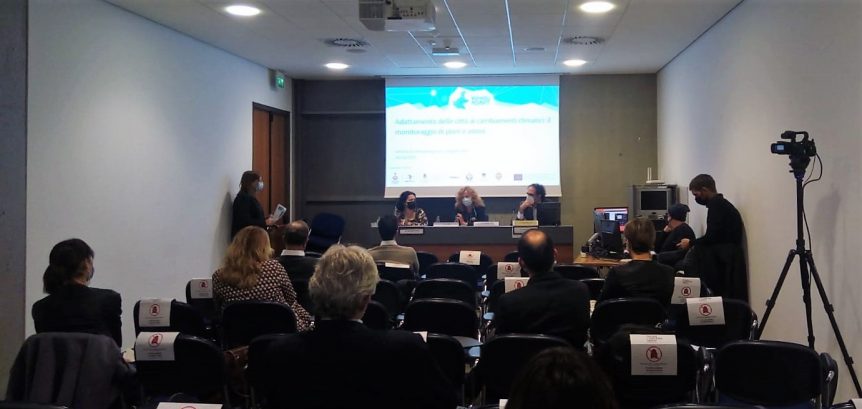The last of the three meetings promoted by the LIFE Veneto ADAPT project was held on 28 October in the framework of the Ecomondo trade fair in Rimini. The meeting was entitled “Monitoring of PAESCs and adaptation actions” and its aim was to activate a dialogue with other cities and European projects dealing with adaptation to climate change, in particular on the topic of the monitoring activities of the SECAPs, necessary to assess the effectiveness of actions and interventions planned.
The meeting was opened by Chiara Gallani, councillor for the Environment of the Municipality of Padua, lead partner of the Veneto ADAPT project, who stressed how important it is to share experiences and different interpretations in order to enrich everyone’s path, always with the hope of developing joint activities.
The importance of monitoring adaptation plans and actions through the identification of environmental and socio-economic indicators was underlined by Gianmarco Di Giustino of CORILA and Francesca Giordano of ISPRA. Ms Giordano presented the Report on Climate Change Impact Indicators within the National System for Environmental Protection SNPA.
The meeting was also attended by the representatives of six European projects. Starting with the SOS4LIFE project, which has developed a methodology for quantifying the impacts on cities caused by soil consumption and sealing and assessing the ecosystem services provided by urban soils. Life SEC Adapt, which involves Italy, Croatia, Spain and Greece and proposes to increase the resilience of local communities, facilitating the transition to a low-carbon economy. Flood risk prevention is the objective of LIFE PRIMES, which is working on the strengthening of warning systems in the partner regions (Emilia Romagna, Abruzzo and Marche) through the development of homogeneous and integrated procedures and information systems at interregional level. Moreover, the CRISI-ADAPT-II project has identified innovative tools and models for the assessment of climate change impacts by designing a series of modules for the evaluation of extreme events. LIFE RainBO whose actions are aimed at building a possible emergency response system through the identification of new climate prediction models and new warning protocols. Finally, LIFE FRANCA has identified three experimental study areas in the province of Trento, selected on the basis of flood hazard, vulnerability of the territory and prevailing economic activities (industry, agriculture, tourism).
A total of 18 projects that LIFE Veneto ADAPT networked in the three different meetings organized, each of which showed how it is possible to carry out concrete and diversified actions and how it is necessary to make known and share with other Italian and European territories the good practices that work.


